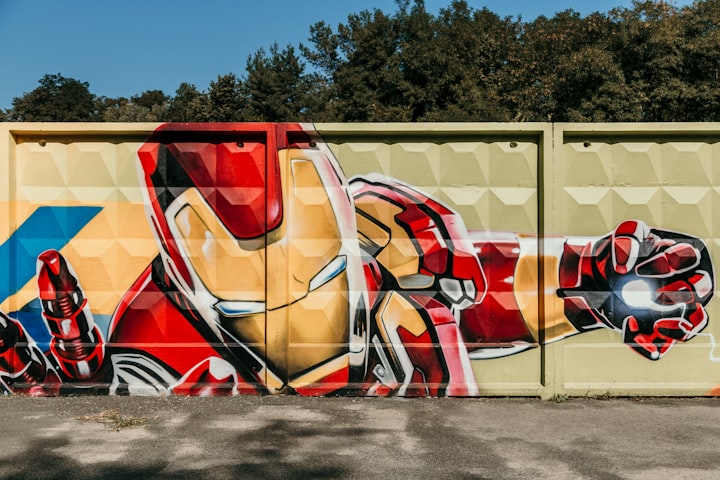What's Under the Cowl?
An examination of the humanity within superheroes

I was born in 1997; an interesting time for comic book movies, to say the least. Batman and Robin was making waves and ruffling feathers, while Steel was doing its best to keep Shaq's film career alive. Superhero flicks were being released, and making enough money to keep the genre's head above water, but they weren't meant to be taken seriously. They were fun!
And that was...fine.
It's no surprise, though, that people quickly got bored of rubber costumes and weak storylines. Batman pulling out a credit card from his suit was funny when we were children; but as adults, it just felt like Joel Schumacher was stepping on our feet. After years of comic books and movies being written off as “for children,” and their fans being depicted in media as either snobbish gatekeepers or painfully awkward outcasts who conveniently fit inside lockers, Tim Burton’s 1989 adaption of Batman was a glimmer of hope! Maybe comic books could be mature! Maybe they weren’t just a cheap way to pass the time! Richard Donner seemed to understand that. While his Superman had its campy moments, it never talked down to its audience. It didn’t shy away from themes like death, self-doubt, and the weight of personal responsibility.
Then, Schumacher gave the Dark Knight a MasterCard, Robin rubber lips, and Poison Ivy the type of dialogue one would expect to hear in a parody.
This article isn’t meant to bash Joel Schumacher. Without him, we wouldn’t have Christopher Nolan’s Dark Knight trilogy. Schumacher was a stepping stone, and his unique style will be missed now that he’s passed away.
Actually, I want to talk about the one thing early comic book films may have done better than their more modern counterparts: the element of humanity.
Sticking with the Batman theme, compare George Clooney’s Bruce to Christian Bale’s. Clooney is far less serious, brooding, and tortured. He smiles with ease, and blends into Society without a hassle. While that does make his Caped Crusader less threatening and more goofy, it also affords him the benefit of extra camouflage. Think about it: Clooney’s Bruce is the typical trust fund sort. If the guy you played golf with every Sunday told you he spends his time beating up criminals and performing insane, life-threatening stunts out of a deep-routed thirst for revenge and justice, you’d think he’s been spending too much time at the nineteenth hole.
Christian Bale’s Bruce doesn’t have that luxury. When he’s not battling the forces of evil, he’s fluctuating between Ostentatious Playboy and Guy So Defensive That He Definitely Has A Huge Secret. One need look no further than his conversation with Harvey Dent in The Dark Knight. To sum it up:
Harvey: “Hey, what are your thoughts on Batman?”
Bruce: “What?! No, he’s crazy! He’s super crazy! There’s something WRONG with him! He’s nuts! Not like me! I’m normal! Totally normal!”
Okay, Bruce. There’s acting natural and then there’s overcorrecting.
Aside from the lack of subtlety, Bale’s Bruce also doesn’t have much separation between his normal life and his alter ego. Where Clooney can turn Batman off and have genuine heart-to-heart moments with Alfred (complain all you want, their bedside talk when Alfred is sick STILL makes my heart melt a little when I see it), Bale’s Batman always talks to his Alfred like a coworker instead of a caretaker. There’s very little affection between them; I suspect because the filmmakers wanted to focus on Batman as an intimidating symbol rather than a man dealing with the pain of his childhood.
That was the trend, for a while. If you were going to make a superhero film, it had to be serious. It had to be Oscar-worthy. It couldn’t be the colorful trip to the circus anymore. Man of Steel brought back the iconic General Zod from Donner’s Superman 2, turning an over-the-top villain into a bitter, cold warlord and showing in detail just how devastating the destruction of Krypton really was. By the end of Man of Steel’s final act, Metropolis has been reduced to rubble; and we’re all left with that heaviest of existential questions: was it all worth it?
While Batman was delving into psychological warfare and Superman was demonstrating the awesome power of unchecked brute force, something else was creeping up in the background: a little experiment known as the Marvel Cinematic Universe.
Starting in 2008 with Joh Favreau’s Iron Man, the MCU kicked off a surprising return to the way things used to be. Really think about it: with his quips, his charm, and his air of complete self-confidence, who does Tony Stark have more in common with; Christian Bale’s Batman or George Clooney’s? Robert Downey Jr. won’t be pulling out a gold and red Amex any time soon, but when is the last time you saw him standing dramatically in the rain with his head lowered in austere contemplation? Does he talk to Pepper (arguably his closest equivalent to Alfred) like a cherished loved one or just another colleague?
All this is to say, we have more to thank the oft-maligned superhero movies of yesteryear for than we might think. As a result of the backlash to “immature” films like Batman and Robin, studios course-corrected so hard that audiences started to realize “Wait, this isn’t fun anymore. It’s high-energy, and my blood is pumping, but I haven’t laughed. I haven’t even really smiled.” We reflected on the louder, zanier fare of eras past; and while they still weren’t GOOD, they were nonetheless memorable and nostalgic. I, personally, am much more likely to watch Batman Forever again than I am to watch The Dark Knight Rises. I connect better with characters who experience the highs with the lows. They have pleasant conversations, they have friendships, they go out on the town (and not just to fancy-dress parties.) When we can see characters enjoying life, it makes us feel for them more when they’re in pain. If they’re CONSTANTLY in pain, we fall into a trap of apathy. They have nothing to lose. What do we care?
We don’t want stone-cold superheroes anymore. If they’re going to protect us, we want to know that they care, they’re doing it because they have empathy for human life, they can’t stand to see innocents suffer. I don’t want to spend two hours watching Batman slog miserably through a job he feels he has to do. I want to see Bruce Wayne saving Gotham because it’s his home and he doesn’t want it destroyed. To borrow a well-known cliche, with great power comes great responsibility. I’ll always prefer that to great power coming with tedious obligation, dower speeches, and a less-than-happy ending.
About the Creator
Michaela Calabrese
Hello! My name is Michaela Calabrese. I've had a passion for writing since I was little; from research-heavy articles with citations galore to lighter introspections about abstract concepts (and some nerdier posts about my favorite fandoms)






Comments
There are no comments for this story
Be the first to respond and start the conversation.